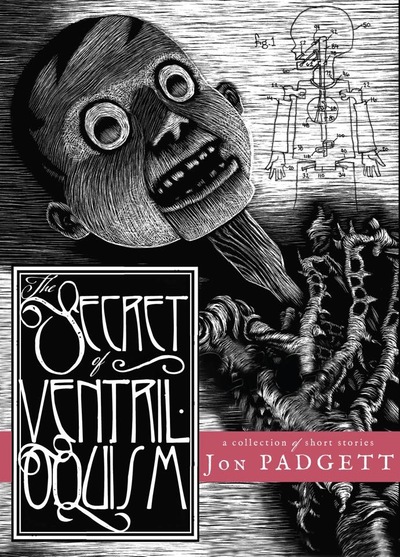A review of The Secret of Ventriloquism, by Jon Padgett

The influence of Thomas Ligotti stalks large across contemporary North American horror and dark fiction, as Stephen King and H.P. Lovecraft once did and mostly still do. Jon Padgett is not slow to acknowledge his debt “to my friend and mentor, Thomas Ligotti, without whom this book would not exist.” Given that tribute, and the book’s focus on ventriloquist’s dummies, straight from the same toybox as Ligotti’s favourite emblems of puppets and dolls, a reader could be forgiven expecting a pastiche of Ligottiesque themes, like the Yog-sothothery that made so many careers in the immediate wake of the Lovecraftian revival. But how wrong they would be.
For one thing, The Secret of Ventriloquism contains exquisitely calculated prose chiseled sharply enough to cut off any suspicion of second-hand knockoffs. As an opener, for instance, “The Mindfulness of Horror Practice” is a short, simple, chilling parody of the kind of induction you might encounter in any tacky wellness session, retooled to evoke icy metaphysical sickness. “Murmurs of a Voice Foreknown” is the kind of boy’s own story that Stephen King could be proud of – finishing with one of the best five-word endings I’ve read in recent horror fiction. “The Indoor Swamp” is a sort of ghost-train horror ride guide that, once again, picks up all kinds of nightmarish existential dimensions along the way. And for another thing, as all that should suggest, Padgett has many more than one string to his bow, or manner to his mummery. There’s quite enough variety of tone, setting, and focus here to surprise and disconcert any reader, and leave preconceived expectations flopping and gasping in the cold black mud of Padgett’s imagination.
Despite the variety, there’s also some conspicuous continuity between stories, especially those directly concerning “The Secret of Ventriloquism,” which itself is a one-act play towards the end of the book. “20 Simple Steps to Ventriloquism” and “The Infusorium” both deal with the same theme, but in utterly different ways – the latter a sometimes brutal noirish ride through Padgett’s iconic hell-on-earth of Dunnstown. Then there are the awful origami dreams of, well, “Origami Dreams,” the grotesque affliction of “Organ Void,” the cold songs of Thin Mountain, and so on. And on. On far enough to outdistance any conceivable accusation of derivative work. Padgett is a chilling master in his own right. You’d be a dummy not to read him…
